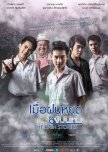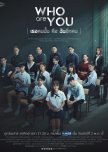
This review may contain spoilers
A series that is reminiscent of the more famous series, The Gifted. Both star Nanon and Chimon, but Ohm is a nice addition here. Both series are also set in a school and have the students on a mission to expose the dark secrets of the school.As a youth drama, Blacklist's focus on the students as the main characters is necessary but it also stretches one's credulity. The teacher who forms the secret group, Blacklist, to expose the school's dark secrets seems highly irresponsible and inconsistent. Yes, he is ultimately not portrayed as a really great teacher, but the characterization is baffling. As a student in the school years ago, the teacher had a friend who came to harm. He suspects the principal. And yet, the principal decided to let him be a teacher there anyway (for unconvincing reasons revealed at one point). And the first generation of students who make up Blacklist end up being KILLED in the process of their investigations yet this teacher has it in him to form another generation of Blacklist and has no qualms about putting the students at risk.
Perhaps we can explain that the teacher is fixated on exposing the principal's deeds and he's not such a perfect person anyway, but for someone who is so passionate about the cause, the teacher is conspicuously absent in many of Blacklist's meetings, merely setting them a mission and letting them discuss (or fight) amongst themselves before settling on a plan.
There's also the conspicuous absence of parents--Traffic gets into a lot of trouble and his sister, Fah, has disappeared, but the parents are never seen--not even a phone call or something is shown. Yes, this is fiction, but even the fictional world of the series has at least one mother crying for justice after her son almost dies in the school.
The story starts off being rather suspenseful and engaging and even fun. Traffic enrolls in a school to investigate the disappearance of his sister, Fah, and realizes that her disappearance is linked to a criminal group of which certain students are members. However, the series goes overboard with plot twists (which may still be ok, but the twists aren't always very convincing, e.g. the revelation that Andrew is sent by the principal to infiltrate Blacklist opens up holes that the writers can't patch despite scrambling to do so). Then addition of a second villain after the first one (the principal) has been nabbed is bizarre though it is not altogether unexpected. It is also bewildering that even after the principal's criminal organisation has been busted, it is still possible to order drugs from some underlings, as suggested by how Traffic calls a number only to realize that it is a number to order drugs. What's more, the riddle used to identify people in the know hasn't changed when he makes the call . (And it's a common riddle you can answer if you had heard of the riddle before. So much for a secret code.)
Perhaps the series would have been better if the writers had gone easy on the plot twists and focused more on character development. The characters do draw the viewer into the story, but there is little development though showing more of how their experiences have changed them would have been interesting.
Was this review helpful to you?

This review may contain spoilers
The premise of the story is straightforward: Five people (Don, Ryo, Plan, Por, Mo) are chosen to play a game created by this person or entity known as Wolf. If they complete 5 missions, they win a sum of money.There are several questions that remain unanswered. Firstly, the missions take place in many countries, but somehow Wolf is able to film the action, even in private places like people’s homes and hotel rooms.
Secondly, the action is broadcast, and people can watch the game. Why do so many of the people approached by the contestants seem to be unaware of the game and why do people not bother to tell them even though the game seems to be such a costly and major production?
Thirdly, Wolf seems like an omniscient, godlike presence who knows more than what any hidden cameras can reveal, but the characters are unperturbed by how Wolf has access to information about, say, one’s ex who has died ten years ago and the locations of people one has met years ago?
However, if we ignore these oddities, each of the five main characters’ stories can be interesting, particularly Don’s.
At the start, Wolf’s missions simply seem utterly unethical. However, it soon becomes clear that the missions help the players change for the better while also helping their targets learn something even if they learn a lesson (such as not to trust others too easily) the hard way.
Overall, the series is interesting and entertaining in its parts, but when there doesn’t seem to be anything more when the parts are added together. Apart from the intersection of Por and Mo’s stories, the other stories barely converge.
My favorite of the 5 contestant’s stories is Don’s story followed by Ryo’s.
Don’s story is well-developed, and the changes in his character are clear. At first, he seems to be the most callous person of the lot because of his willingness to charm an innocent girl into having sex with him by claiming to love her, but it is later shown that he has become like this because of a past relationship. By the end of his second mission, in which he has to stay with a girl without touching her, it is clear that he has changed. At one point, we see him ignoring Wolf’s message when he completes a mission to get a woman to smile again, which is a hint at how he is helping her sincerely and not to complete his mission.
Ryo, the youngest character, vacillates between exuding youthful innocence and developing toxic masculinity. Like the other contestants, the process of playing the game changes him for the better. His innocent crush on a schoolmate, something which he has kept to himself for a long time while boasting to his friends about his non-existent sexual exploits, remains one-sided, and he learns to accept rejection and respect women in the process of the game.
Plan’s story is good but somewhat predictable. He is shown to be a troubled character from the start. His preoccupation with money stems from the death of his mother because of the lack of money for her medical expenses, and it’s not hard to guess what lesson he has to learn. He starts off being someone who can be callous to others for the sake of money, but later becomes truly sorry for what he has done. Unfortunately, the reason for his change is not clear. The mission in which he forms a friendship with a lady addicted to shopping because of her emotional issues is more memorable than the other missions he has, and is probably the turning point in his development.
Por starts off being a playboy with no qualms about hurting the women he has relationships with. In the process of playing the game, he changes somewhat, deciding to be brutally truthful to an ex about his mission to make her fall in love with him again so that she would hate him instead of continuing to miss him. Nevertheless, the change in him does not seem all that deep.
Mo, an ex-girlfriend of Por, is still recovering from her breakup with the philandering Por. She learns to come to terms
with her feelings. She’s a likable character, but there isn’t much development.
Ultimately, the players are all winners—even those who don’t complete all 5 missions have undergone experiences that change them for the better. Their individual stories are at least quite interesting, but when put together, they don't quite give any extra satisfaction.
Was this review helpful to you?

This review may contain spoilers
Often implausible, but interesting and has nicely developed main characters
As a mystery/detective series, the cases in the story are intriguing enough. However, the way the cases are solved is often too far-fetched. The skills of Shen Yi, an artist turned cop, are better placed in a series featuring someone with supernatural powers. And while the biggest case of the series (the one case that, by convention, we are introduced to at the start and only gets solved right at the end) does get very interesting, the way the case is solved seems a little too implausible (and it's not because of Shen Yi's skills, which we have probably gotten used to by the end of the series).Still, there is plenty to love about this series. The acting is good. The portrayal of the changes in the relationship between Shen Yi and Du Cheng is excellent, making them characters whom we feel for. They have pretty solid back stories that are related to the mystery cases and shape their respective characters. The friendship is nicely developed without pandering to fans who want to see bromance, and this may be a good thing too. We see how Du Cheng is at first hostile towards Shen Yi, how he begins to recognize Shen Yi's abilities, his increasing concern for Shen Yi, his protectiveness towards the artist who barely knows how to use a gun, and his genuine acceptance that Shen Yi should not be blamed for an incident causing a senior policeman to die years ago. Even before Du Cheng says it directly, we can see that he regards Shen Yi as a friend and a colleague he looks up to. And eventually he uses the term "buddies".
If you are really demanding in terms of the plausibility of the cases and how the are solved when it comes to detective stories. I won't really say this is highly recommended. But if you can suspend a bit of disbelief and take it that Shen Yi's abilities are so extraordinary that they border on being superpowers, this is actually a very enjoyable series.
Was this review helpful to you?

This review may contain spoilers
This one didn't rise well
Bake Me Please is a rather watchable BL. It could even have been quite good for those who do not mind predictable stories. However, certain weaknesses in plot development affected the characterization.Shin is a baker in a bakery he has started with his friends, Oab and Guy. One might wonder how he even had friends to begin with because of his cold demeanor, but we can overlook this. Oab's mother makes his brother, Atom, join the bakery, and Atom in turn pulls his friend, Peach in. As you might guess, Shin and Peach fall in love.
The story doesn't quite impress with originality, but to its credit, it doesn't. It can be a fairly good run-of-the-mill BL. Unfortunately, some flaws do compromise the watching experience. Some parts lack coherence in somewhat bearable ways. Peach's grandmother has been clearly open to Peach and Shin having a relationship, but Peach behaves as though he is surprised when his grandmother is totally fine with it when Shin announces that they are dating.
The worst moments in the series are the rather forced turns in the behaviors of the characters to fit rather forced turns in the plot. The first of these turns is when Guy quits to join another bakery, tired of playing second fiddle to Shin all the time and probably because he is jealous that his crush, Peach, is a couple with Shin. Guy is a fundamentally good person, so it is odd that there is no sign of hesitation or struggle when he does some of the less than honorable stuff he does. Then there is Shin's behavior. Although he is socially inept and even harsh with his words, he is not an unreasonable person, especially after meeting Peach. However, he refuses to let Peach continue his friendship with Guy and breaks up with Peach simply because Peach goes for dinner with Guy. The poor plot development mars the characterization as well.
I think the writers should have opted for the feel-good factor throughout by developing the plot in a different direction. The story does end pleasantly, which salvages things somewhat.
Was this review helpful to you?

This review may contain spoilers
Thought-provoking gay-themed short film
A gay-themed short film (not quite BL) that is quite worth watching. Just don't expect fluff and an escapist love story.The short film touches on may gay-related issues, the first of which is the predicament of the less athletic, less conventionally masculine individual in a setting like an all-boys school (or simply any school). Jun Seok's reluctance to attend the PE class at the beginning of the film is obvious. (Maybe I'm projecting myself into him, but I think it's possible that he even deliberately turns up late, which will get him the punishment of running ten rounds, just so that he can avoid playing team sports with the other student for part of the lesson.)
Ironically, it is not Jun Seok but Jung-hyun who is clearly gay at first, as suggested by the way he glances as Jun Seok taking off his shirt and later by Jun Seok saying that he saw him looking at other guys. It's just Jung-hyun finds it easier to blend in with the crowd. This says a lot about inequality even amongst gay people as those happen to be more conventionally masculine tend to have a choice regarding how far they want to seem to blend in with the rest, and they might even end up ostracizing other gay people as a result.
What is surprising is that there isn't even a lot of overt homophobia featured in the film. Min Jae may appear to be the homophobic one who creates trouble for Jun Seok and Jun-hyun by spreading rumors about them. However, it is not entirely clear what his motivations are. Quite early on, we see Min Jae talking to his friends, mocking Jun Seok for being bad at dribbling the ball during PE. Interestingly, his mockery does not gain much traction, and his friends remind him that he sucks at it too. He then begins saying that Jun Seok is acting like a girl, but his friends do not seem to care either.
Eventually, it is Min Jae who finds out about Jun Seok and Jun-hyun's relationship when they have a date of sorts in a storeroom in school. (Has Min Jae been secretly following them around to confirm his suspicion about their relationship?) Min Jae then spreads rumors about Jun Seok and Jung-hyun--even though there is no indication that he has seen the two of them kissing or being. However, it is worth noting that he does not appear to be doing so to exact vengeance on Jung-hyun, who has earlier on told him off for mocking Jun Seok's poor dribbling skills during PE. On the contrary, he seems to be doing so to separate the couple and keep Jung-hyun firmly in his clique. Jung-hyun distances himself from Jun Seok after Min Jae tells him about the rumors (I assume he does not reveal that he is the one who spread the rumors to begin with)--and the purpose appears to be to separate the couple rather than to victimize them for being gay. Min Jae does not appear to want to harm Jung-hyun, after all.
I can only guess, then, that Min Jae's actions are possibly motivated by jealousy. (Remember the ironic similarity between him and Jun Seok? Maybe they are similar in more ways than one.) In an environment where people think that they are supposed to exhibit masculinity in a certain way, they may not even come to terms with their own sexual orientation. This is despite the relative nonchalance of the classmates. The classmates, both the guys in Min Jae's smokers' clique and the rest, may gossip, but the film doesn't show them bullying either Jun Seok or Jung-hyun. Yet, the pressure is always on the queer individuals, who do not know when the reactions of people around them can turn nasty. (This is quite realistic, from personal experience. Sometimes there is no overt bullying, but you may find it hard to belong even though people may not be deliberately doing nasty things to you either. Nonetheless, it still feels awful.)
In the end, while Jun Seok seems to be the most obvious victim in the film, Jung-hyun is also a tragic figure. As he himself seems to realize, he is, unlike Jun Seok, not used to being gossiped about. When he is the subject of gossip, he buckles under pressure. We might see that his privilege of being able to tell Min Jae off for mocking Jun Seok is predicated on how he is not perceived as being seen to be in the same league as Jun Seok. The moment he allows himself to be aligned with Jun Seok beyond being Jun Seok's friend, he will lose this privilege. Whatever he chooses, he has a high price to pay.
Was this review helpful to you?

This review may contain spoilers
Interesting time loop BL
The question in my mind when I started watching this series: you mean this is a TWELVE-episode series about a doctor who has to keep going back in time until he saves this person. (Won't it get boring by Ep 2? And how on earth do you have BL if the protagonist is just going back in time to do something different to save the person in the ER?Expectedly, the only way to avoid repetitions with few possible variations is for the doctor to go back to different points in time. And the ostensible mission he's given is modified: it may not really be about saving this one guy he doesn't even really care about at first.
Yet, the series surprises with rather nuanced characterization. The characters seem a bit different from one loop to another, showing how slight changes to one's experiences can have significant changes to one's values and character. There is a lot of fun in the time loop premise, but the series avoids being frivolous. Ultimately, it seems to be saying that, unlike the characters, we don't have multiple chances to try again in life and it is important to do what is right--a bit of kindness can change everything for the better while a moment of callousness can make everything turn out unexpectedly terrible.
It takes quite a few episodes to get to the BL. I think this is evidence of confidence that the story is good enough to draw audiences in even without the BL. No one finds it necessary to make the lead actors bare skin or have a kissing scene in Episode 1 when the story doesn't call for it (compare this with series in which someone dreams of or fantasizes about a kiss in Ep 1 just so that there is a kissing scene to titillate the audience).
While the main characters are flawed, they need to be characters we care enough about before the time loops can be interesting. And this is deftly handled. Dr Tin has a back story and his character changes as he undergoes the time loops--from trying to save Tol just so that he can get out of the time loops, he becomes someone who genuinely cares. The story also becomes more intriguing as Dr Tin discovers more things each time he returns to the past. The stakes also get higher with each return to the past, so there is a lot to keep us watching.
Triage may not seem exceptional at first, but it is certainly one of the more unusual Thai ELs. Don't be deceived by the hospital setting. For a story with a strong supernatural element, the medical drama parts are surprisingly good (at least to someone who doesn't have much medical knowledge like me). But this isn't just another BL featuring a doctor.
Was this review helpful to you?

This review may contain spoilers
Cute, funny, moving
My Love Mix-Up! is high-school setting BL done right. It does not try too hard to be original about teen love, and it does not end up being silly. Instead, it's a cute, light-hearted comedy that manages to be sweet and moving. And it is very well made.The misunderstanding that starts everything is cleverly used to show something about the main characters. Aoki's kind, lovable nature in admitting to Ida that the eraser with Ida's name is his so as to save Hashimoto from embarrassment is clear from the start. Although he has a crush on Hashimoto and is disappointed, he does not react with toxic jealousy. Ida's serious but open-minded nature is also seen in how he reacts to Aoki's "crush" on him. There could have been a love triangle, but the revelation of another misunderstanding resolves things nicely, enhancing the general light-heartedness of the series.
Apart from the romance, the friendship that develops between Aoki and Hashimoto is a nice touch as they encourage each other and comfort each other. In general, the world of My Love Mix-Up! is simple and innocent. Surprisingly, there is no pretense that homophobia does not exist, and the series does not ignore the issue. But it addresses it without becoming too serious or dismissive of the issue.
Much of the series' funny moments depend on Michieda Shunsuke, who plays Aoki, and he is pretty good with them. At the same time, he is able to restrain himself from exaggerated expressions in the moments that are not meant to be funny. This makes the character a nice contrast to the straight-faced Ida.
My Love Mix-Up! may be a series that makes us wishing for more of its goodness, but the ten episodes are nicely paced and nothing feels rushed. The ending is satisfying, and here is no cliffhanger for a potential second season, though I certainly won't mind one as long as it is equally good and doesn't ruin things.
Was this review helpful to you?

This review may contain spoilers
Were scenes clobbered together to make a series after the filming encountered problems?
The supernatural element in this series could have been used to tell an interesting story, but it ends up being redundant and even weakens the story.Tae, who initially has a crush on Bhu, summons this angel of love (something like that) by chance. He decides to call the angel Nite, and predictably, Tae and the angel develop feelings for each other. There is some promise in this despite the predictability. There is even some nice build-up regarding how Nite is unable to stay permanently, so the question of how the romance will end up looms over the viewer.
Unfortunately, the disappearance of Nite is too abrupt. I don't just mean it's abrupt for the Tae in the story. It occurs too suddenly in the story and leaves a thick narrative thread hanging. To make matters worse, the disappearance is followed up with a very brief scene of Nite missing Tae in some heavenly realm, making one think that there would be more in the story about this angel. However, Nite the angel doesn't appear in the story anymore except as flashbacks and Tae's hallucinations. These flashbacks are perhaps added in to give the semblance of continuity, but they are counterproductive as they keep reminding us of the unanswered questions we have about Nite. (Then again, some episodes would be even shorter without them.)
After Nite's disappearance, a miserable Tae meets another guy called Nite and has a one-nite-stand with Nite2. Besides the name, there are things about Nite2 that reminds one of Nite the angel. Again, we get teased with a promise that there would be some continuation of the Nite1 story. However, those expecting some actual continuation will be disappointed. There is no apparent explanation for or purpose behind these coincidences.
Eventually Tae falls in love with Nite2 and overcomes his fear of kissing someone he likes lest the latter should disappear, so at least there's a happy ending. The series is not that bad if we look at different parts separately, e.g. if we pretend that the story of Tae and Nite1 is a different story from the story of Tae and Nite2. What makes the series rather weak is how everything is put together. It also doesn't help that Tee, the actor for Tae, looks like another character altogether with his new hairstyle. Because the scenes are not always filmed in the order they eventually appear in the series, the change in his image also affects continuity. The conspicuous loose end of Nite 1's disappearance is not tied eventually.
The other couple, Bhu and Que, appear quite prominently in the series at first even though their story does not strongly intersect with Tae and Nite1's. However, they seem to be largely written out after the disappearance of Nite1. There's some poor excuse for Bhu's brief re-appearance at the end of Episode 11 (repeated at beginning of Episode 12), which indicates an awareness of flaws in the story, but it does not salvage things. Perhaps some practical issues affected the filming, but the effects on the series as a whole are quite serious.
The differences in the length of the episodes also seem rather glaring—some episodes seem exceptionally short. Again, it is a sign that the filming process was affected by some unforeseen circumstances. Unfortunately, any attempt to salvage the series was not successful in helping it fulfil the potential it had at the start.
We are left with this strong sense that the story that we see is quite different from what was at first intended, and not in a good way.
Was this review helpful to you?

This review may contain spoilers
At times nuanced, sometimes muddled
A collection of 3 different stories loosely linked by the motif of rain.Story 1: Disabled boy falls in love with schoolmate
This is probably the best of the three. The story is easily summarized: a disabled and overweight gay boy (Nana) falls in love with a younger schoolmate (Gent). A mutual friend finds out about the crush and tells, without malicious intent, the Gent about it. Feeling disturbed, Gent begins to behave coldly towards Nana. Despite saying that he just wants to continue being friends, Nana continues expressing his love. On Gent's part, he seems more concerned about hiding his friendship with than anything else.
To its credit, the film portrays Nana to be a very human character complete with flaws and not merely as someone we can sympathize with. Posting a picture he has taken with Gent on Facebook despite having promised Gent not to do so doesn't seem right. As for Gent, despite his willingness to be friends with Nana, he seems embarrassed about being friends with him too--but only after he is being teased about it. We can understand both the characters: it's not easy to simply erase one's romantic feelings for another person even if you agree to just be friends; it is also difficult for a young person like Gent to ignore teasing by others and be assertive.
Then again, Gent can also be a bit of a jerk. He wants his friendship with Nana, but he also wants to avoid teasing. When no one is watching, he gets close to Nana, even possibly with a hint of romantic affection. Nevertheless, he does tell Nana emphatically not to tell anyone about their outing and not to post on social media photos of them together, so it isn't right for Nana to do so.
At its best, this segment is sensitive and sympathetic while being nuanced in its portrayal of the characters. Unfortunately, the nuances may also make the film seem a little confusing because too little time is spent on the exposition of the characters' inner struggles, particularly Gent's (because the story is told from the perspective of Nana).
Story 2: A boy discovers that his biological father is transgender
This story could have been interesting but for some reason is too short and ends too abruptly, making it the weakest of the three segments. Bas is best friends with Boy. Bas' mother is dying of cancer, and she introduces him to his "aunt" who turns out to be his father. I have the impression that the father is transgender and has transitioned although the subtitles use the term "ladyboy". Unable to accept the truth, Bas leaves home and then . . . um, realizes that his parents love him and Boy loves him. Bas and Boy kiss in the rain and they return home the following morning, holding hands.
Story 3: A eighteen-year-old student develops an ambiguous relationship with a man he almost prostitutes himself to
I really want to like this story more. It's the longest segment, and he story is more developed than the second segment, but it might as well have been given less time.
Tae is in debt and considers prostituting himself to gay men (his friend claims that he won't earn money prostituting himself to women; I'm not sure if this involves some sort of stereotype). He ends up contacting Nont online and agreeing to sell himself for 20,000 baht. But when Nont sees Tae, he gives Tae the money to pay his debt and asks that he stops gambling, without asking Tae to have sex with him.
Tae is quite an asshole. He goes back to Nont who indulges him with more and more money. This is inexplicable given that Nont is obviously not stupid, but fine . . . perhaps he has a soft spot for Tae, and he has plenty of money anyway, so who are we to judge him for giving away his money like that?
Did I say Tae is an asshole? Apart from getting money from Nont, he has sex with girls, secretly films the footage and apparently even blackmails them. But when he sees another guy coming out from Nont's house after not seeing Nont for some time (the sort of transaction that Tae has never fulfilled has just taken place), he gets jealous and is so upset that he prostitutes himself to another gay man swiftly. If he simply wants Nont's money, he could tell Nont that he has done this to manipulate Nont, but he actually does it while feeling miserable. Sure, Tae has possibly developed some affection for or dependency on Nont who has been so indulgent, but it does not seem like his affections would make him so jealous and possessive that that he would prostitute himself to someone else (note that he hasn't even had sex with Nont until this point, after getting lots of money from him).
Somehow, Nont seems apologetic for being unfaithful to the prostitute who has never fulfilled his part of the transaction, and the two of them make up. Tae starts living with Nont (but they never have sex despite sharing the same bed).
The character of Tae is one muddled mess, intentionally or not. He wants Nont to stop smoking for the sake of his health so that they can spend many years together. (How sweet! Or is he just afraid that the sugar daddy who expects nothing will die too quickly?) For a while Nont and Tae seem to be really happy together. but Tae seems to be continuing with the same old heinous tricks with women.
Nont eventually realizes that Tae is in love with someone else and decides to end the relationship. (Ah, finally!) At the same time, Tae's ex-friend exposes his shenanigans and general assholery to this girl he is in love with. Devastated, Tae calls Nont, clearly his greatest source of consolation (and money). He is unable to get through, and later discovers that Nont has decided to sell the house. When Nont eventually meets him, you might think that he would show some appreciation for this person who has been treating him so well all this while. But no, he tells Nont that he can't love Nont anymore because he is in love with someone else.
Fine, maybe Tae has come to his senses and decided to come clean and be honest to Nont finally? No. When Nont says coldly that he has known that Tae is in love with someone else for some time already, he starts accusing Nont of being rude and not caring for him. Nont then leaves him for good. The story ends with Tae crying in the rain, supposedly a very sad scene. Hey, if nothing else, it seems like a sadder ending for Nont, who is at least a flawed person with some goodness in him.
Perhaps the story is a tale on human fallibility and how we might take the people who care about us for granted until it is too late. But for the story to convey this, Tae would need to much a lot less of an asshole who thinks that he can expect Nont's continued love and care even after he tells Nont that he is unable to love him. Unlike in the first segment where Nana is a flawed character whom one can sympathize with, it is hard to feel sad for Tae at the end of the third story. It's hard to believe that he is truly in love with the girl or that he is truly sorry about what he has done to Nont. Unless "a bastard loses the best sugar daddy he can find" sounds like a good pitch for a tragedy to you, the ending might even put a smile on your face.
Was this review helpful to you?

This review may contain spoilers
This is a remake of the Korean drama, but I haven't watched the Korean version. On its own, the Thai version is good.Namtan is convincing as the twin sisters with different personalities, Meen and Mind. The rest of the cast is really good too, especially Jamie as Kat in a supporting role. Krist is good as Natee though one may wish that Natee were a more multi-dimensional character.
I'm not sure how much credit goes to the original Korean scriptwriters, but the story is interesting. The plot about Mind as a badly bullied girl losing her memory and being taken as Meen is complemented with a suspenseful subplot about the death of a girl called June (Meen's friend).
The series seems to be targeted at teenagers and surfaces a lot of issues confronting teenagers, from school bullying to parental expectations and stress over grades. This series contains some of the most astonishingly terrible examples of parents I have seen (particularly the parents of the bully, Tida). In fact, for a large part of the series, Natee's father and Meen's mother are the only truly good parents. Ironically, Meen's mother does not even have any biological children of her own and she is a better mother than those who have given birth to their own children.
It is not very convincing when most of the parents (e.g. Pete's mother and Gun's parents) become better quite suddenly, and there seems to be an excessive eagerness to send a positive message in the last episode. This undercuts the seriousness of the problems in society, such as the bullying of an orphaned girl to the point where she attempts suicide. However, this doesn't affect the show much.
I believe the weaknesses of the original Korean series are present here as well. The depiction of Gun seems a little formulaic (the second-male-lead syndrome strikes). Kay has performed the role of Gun well, but Gun doesn't seem to contribute much to advancing the plot (especially in the later part of the series) and appears to be merely there so that the female lead has not one but two ridiculously wonderful guys as suitors.
While the plot and acting are good, there could perhaps be more distinctions between the Korean series and the remake. From the comments I have read, the changes are minimal. Working towards a different ending would have been interesting. For someone like me who has never watched the Korean version and don't intend to, however, this is still an engaging series.
Was this review helpful to you?

This review may contain spoilers
This 2-episode "series" (actually more like a short movie) is for fans of Mean/Plan coupling who can't get enough of them. The background: Many fans of Love by Chance (Season 1) lament the lack of a happy ending for Tin/Can. (They do have a happy ending in the original story, but we will have to wait until Season 2, if it gets made and has a Tin/Can focus.) So many were pleasantly surprised by ReminderS, which features Mean and Plan as a couple reminiscent of Tin/Can and this couple has a happy ending.
ReminderS turned out to be fairly enjoyable because the other couples have a stronger story behind them, e.g. in the Son/Pin pairing, Son learns to play the guitar to give Pin a birthday surprise, but this causes Pin to be mistaken that Son is two-timing him. While there are plenty of comic effects, the seriousness of the emotions are genuine enough to be taken seriously.
This is where 2Wish fails. Already, Two/Wish was the couple with the weakest story in ReminderS. 2Wish is a sequel focusing on this couple. The weakness of the story could have been salvaged in 2Wish with a better script. Unfortunately, while things get a bit more intense towards the last ten minutes or so, the are too many missed opportunities. Instead of showing meaningless scenes of the couple cleaning the house or introducing a practically irrelevant side character like Art, the motivations and struggles of Two could have been given more focus. In this regard, the character of Wish is handled a bit better, with him turning from someone who can't cook to someone who would make meals for his boyfriend out of love (unfortunately, even this comes across as being rather random).
In the end, the viewer is left nonplussed by Wish's behavior--what is he really so upset about, and the reconciliation between the couple seems rushed.
There's quite a bit of sweetness that could have been satisfying for BL or Mean/Plan fans if only the characters have been developed as characters viewers actually care about.
Was this review helpful to you?

This review may contain spoilers
Cute and nicely made with a bit of unfulfilled potential
Semantic Error is nicely produced. There isn't much that is original about this BL, be it the enemies-to-lovers plot, the 'opposites attract' sort of romance or the problem that one party is going overseas. However, the production value is high and the computing metaphor is nicely sustained throughout.There is nice attention to detail. I like how Sang Woo's costume changes reflect the changes in his personality, like how he stops wearing checkered shirts and then stops wearing a cap everywhere. And while the enemies-to-lovers plot may have at least one party being rather toxic, in this case, they are mostly just being childish.
While the series has been very well received, I somehow find that an additional something could have brought it to greater heights. The BL couple is likable; they look cute together and the kissing scenes are nicely shot. Yet, I can't help but feel that something more could be done about the depth of their love. We see them thinking about each other and pining for each other after they have a fight, but perhaps the complexity of each of their feelings could have been more strongly depicted. And I'm not talking about the introduction of passionate sex scenes or things like that. But when Jae Young gives Sang Woo a birthday present, for instance, perhaps the process of how he prepares the present could have been shown to show how much he really cares. Sometimes the scenes that do help to show their feelings are a little too brief. The symbolic significance of the scene in which Sang Woo looks at a picture Jae Young has drawn on his hand could have been explored more deeply. It could show Sang Woo's sadness when he thinks that Jae Young is disappearing from his life. It could also show how Sang Woo is being wistful thinking about how quickly the time he spends with Jae Young has passed although Jae Young has been a nuisance to him at first. Of course, it can also show that he is thinking of how they won't last long as a couple even if they start a relationship. Unfortunately, the scene is a little too brief to really help explore Sang Woo's thoughts and emotions fully.
The characters are people who are easy to like and care about, which is always a good thing for a BL series. However, I think I could have felt more for them if the full potential of the scenes had been fulfilled.
Was this review helpful to you?

This review may contain spoilers
Excellent intertwining of mystery and romance
In case anyone is wondering, the reason this series has an 18+ warning has (probably) got nothing to do with the BL elements but everything to do with the crimes depicted, which are pretty dark and involve sexual exploitation, including the exploitation of underage people.I believe there are many BL fans who are drawn to the series because of the promise of BL. Personally, I was somewhat unsure about it (as someone who watches a lot of BL) because the the crime/thriller story in the synopsis doesn't seem to cohere well with the BL genre, but I was pleasantly surprised to see how nicely the main characters' romance is woven into the story involving some rather heinous crimes.
We can perhaps see this series as a thriller with romance in it, like many series that focus on straight relationships instead of a gay relationship. This story happens to feature a gay romance, but perhaps the "BL" label shouldn't be used here. I personally think that not every story with a gay romance in the main plot is BL, which is a genre that has certain quirks. If you are looking for a series that is largely focused on the love between them like many other purely BL series, you are better off watching something else. Nevertheless,, this series has a prominent romance narrative thread that is nicely intertwined with the narrative involving various murders.
The relationship between Tan and Bun (played by Max and Tul) is beautifully developed. The mutual attraction between them from the start is nicely portrayed, with Bun barely able to conceal his disappointment when he thinks that Tan is his female friend's boyfriend. Yet, despite his attraction to Tan, Bun is unable to trust him unreservedly at first because of how Tan is possibly involved in the crimes. Bun's complex emotions towards Tan as the mystery starts to unfold make their relationship interesting. The audience is also, for a while, left guessing what sort of person Tan is. Is the attraction purely sexual? Is it deception? Or is there genuine love on both sides?
Even without the romance narrative thread, the series is already pretty solid as a thriller, with the mystery being unraveled at a nice pace with some twists. A couple of twists are somewhat predictable but they don't weaken the story. One may be incredulous that, in an age of easy digital reproduction and dissemination, people can still think trying to getting back the original digital video of their incriminating acts. However, the flaws of the series are fairly minor. The story is well paced and nothing seems too rushed or draggy.
The strength of the series as a thriller makes the choice of featuring a gay romance commendable. After all, the story can very already do very well on its own with bromance or straight romance. In fact, there is a risk in featuring a gay relationship. It can either be a hit (since BL has a lot of fans) or a miss (since audiences beyond the BL fan base may not like the gay romance plot). The series does target and pander to BL fans, but not in a childish way. There is a kiss between Tan and Bun in the first episode (and even at least one possible side BL couple for us to ship), but the elements made for BL fans are worked quite seamlessly into the story. The final episode also has one of the tenderest gay romance moments I have seen in BLs in the past year or so.
I'm not sure how popular the series is currently, but I wish it will prove to be commercially successful. This will be a good impetus for a higher visibility of gay characters in mainstream productions.
Was this review helpful to you?

This review may contain spoilers
Marketed or discussed as BL but this is so much more
With two main characters who are interested in cinema, this is like a Filipino answer to the Thai series, Theory of Love. Sensitive and intelligent, it nicely occupies the space between typical BLs and gay dramas, critiquing the narratives about gay people while spinning one at the same time. The result is a really moving story that is hard to flaw even if it may not be every BL fan's piece of cake--and that one of the ideas it explores.Indeed, Like in the Movies makes the point that it isn't exactly ethical to tell stories about someone or a group of people (such as gay people) to pander to others. In one of the many witty lines in the series, Vlad tells his friend that he refuses "to be a plot device that triggers somebody else's identity crisis". Turning a character into a plot device in this manner is all too common in BL, with the multitude of apparently straight characters who inexplicably fall in love with other male characters.
Don't get me wrong though--I don't think the series is necessarily dissing all the BL stories and series out there. In fact, it could be paying tribute to the way they have help to raise the visibility of gay people. There are several allusions to the Italian movie Cinema Paradiso in which a priest makes a cinema projectionist to censor kissing scenes he finds objectionable but the latter puts the censored scenes together into a reel of film that is eventually watched by the protagonist of the film. Perhaps the allusions remind us of the power of stories and of the moving image to bring to visibility the elements that are traditionally repressed in a society, and BL stories are no different. (The way BL has become somewhat mainstream in the last few years has hopefully done something to normalize gay people in the eyes of the public.)
While it is tempting to think that Vlad ironically does end up being a plot device to trigger Karl's identity crisis, this isn't really true as we can guess that Karl is gay but closeted from the start, and the series doesn't attempt some twisted claim like he's not gay but just in love with one guy in the whole world. In the first episode, when a shirtless Vlad comes out of the bathroom and asks Karl if he has seen anything he likes, Karl (who has been ogling) retorts that Vlad shouldn't think too highly of himself. But it turns out that Vlad is only asking Karl if he has found a job posting he is interested in. Then there's the suggestive dialogue and looks when Karl tells Vlad to wear some clothes a few moments later:
Vlad: What's your problem with my body?
Karl: I'm getting wet.
If all these doesn't make it obvious enough that Karl is aware of his own homosexuality, he later also dreams of a seduction scene in bed involving Vlad and himself.
In the end, both Vlad and Karl do acknowledge their attraction to each other, but Karl remains closeted. The main source of tension isn't whether they are attracted to each other but how they can be together when one of them has had enough of hiding his sexuality and the other simply isn't ready to come out to others, particularly his parents.
The series proves to be sensitive in the way it portrays the conflict though. It doesn't preach or show Vlad's openness to be the way to go. Not many BL series give enough thought to gay people who are not ready to come out to everyone. In Dark Blue Kiss, for instance, Kao's reluctance to come out to his friends and mother is depicted to be something of a problem and the acceptance from them comes so easily that it is a tad unrealistic. (DBK isn't bad in any way, but it's always nice to have a different perspective.)
Within just 8 episodes, the series has managed to tell a good story about two guys who meet and fall in love (not strikingly original on the surface) but it manages to be so much more as it questions what it means to be an "ally" of the LGBTQ and portrays characters whose struggles are universal--the main characters are not just gay men; they are people who happen to be gay.
While many BL series from Thailand (which I'm a fan of too) seem to be adaptations of novels that are straight women's fantasies of men, Like in the Movies is refreshing in that it doesn't seem to have such a starting point. I hope there will be more BLs like that though, of course, this would also mean that the boundaries of BL will be pushed. Such a series may not please every BL fan but it deserves to have its place too.
Was this review helpful to you?

This review may contain spoilers
Censored BL with a naughty title
This could have been something more interesting, but it clearly has been censored or self-censored until there is barely a story.I won't go as far as to say that the BL has been transformed into bromance. In fact, romantic feelings are quite strongly hinted. However, it is quite inconsistently done. In one episode, Nan Bo Wan acts like he has been "bent", but after that acts like his usual self again. In the last episode, the romantic feelings are hinted at again. The randomness is particularly jarring in the last few episodes.
Ultimately, this is a someone insipid BL that can perhaps be forgiven because we know the censorship situation in China. The title (Bai Li Tiao Yi) is perhaps the most BLish thing about the whole series. It refers to the names main characters, Bai Li Qian Chuan and Nan Bo Wan (which sounds like Number 1). You are certainly not imagining things if you suspect that the translated title has some sexual innuendo. The playful double entendre is also present in the Chinese title, which means Bai Li Selects 1 or Bai Li Selects (His) Top.
Was this review helpful to you?

 1
1 1
1
















